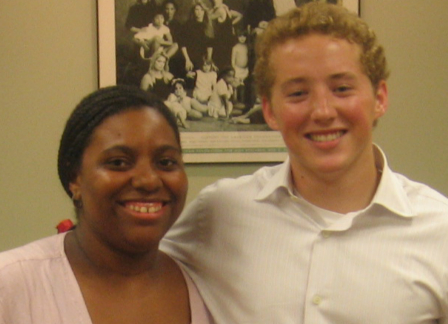Empowerment Through Advocacy: amfAR Interns Take on the Hill
By Candace Webb
August 28, 2006—I was propelled toward HIV/AIDS advocacy when the disease became a part of my own reality. My family became one of many families in the African Diaspora disproportionately experiencing the epidemic firsthand. I felt the pain of losing—from AIDS-related complications—family members I cared for deeply. The tipping point for me was experiencing how the premature death of a parent from HIV—a preventable and treatable disease—can destabilize a family and virtually an entire community.

amfAR interns Candace Webb and Colin Gilmartin helped lobby for legislation that would protect young people and women from HIV/AIDS. |
When I became a youth HIV activist during college, it was neither glamorous nor popular, but I knew it was necessary. The reality was that the U.S. HIV/AIDS epidemic was changing and it was looking more and more like me—younger, female, and African American. Fortunately, I found a nationwide network of youth HIV activists, particularly other young women of color, through my membership in the Advocates for Youth Young Women of Color Leadership Council.
Through my involvement in the Council, I attended the National Black Women and HIV/AIDS Conference, when I met Judy Auerbach, amfAR’s vice president for public policy and program development. A seasoned HIV advocate, Judy took the time to reach out to me during one of the conference sessions. This conversation eventually led to an internship at amfAR’s public policy office in Washington, DC.
On Monday, July 24, I was among 50 interns representing an array of organizations from across the policy landscape, who gathered for Lobby Day to learn how to lobby Congress. We were then able to put our new skills to use by speaking with staff from our lawmakers’ offices about the Protection Against Transmission of HIV for Women and Youth (PATHWAY) Act of 2006.
This piece of legislation, introduced by Congresswoman Barbara Lee (D-CA), hit close to home because HIV/AIDS has created a crisis in the black community and it has had a particularly severe affect on women and girls. Now, through Lobby Day, I had the opportunity to openly communicate with my lawmaker’s office about women and HIV/AIDS, and the positive impact this bill could have on addressing the vulnerabilities of women and girls in countries receiving U.S. assistance through the President’s Emergency Plan for AIDS Relief (PEPFAR).
Because PATHWAY is a relatively new bill, we had to educate congressional staff about its importance. We explained that it would alter current U.S. global AIDS policy by:
- Requiring the U.S. Office of the Global AIDS Coordinator (OGAC) to establish a comprehensive and integrated HIV prevention strategy that addresses the vulnerabilities of women and girls in each country receiving U.S. assistance to combat HIV/AIDS; and
- Striking the funding earmark in PEPFAR that requires one-third of prevention funds to be spent on abstinence-until-marriage programs.
I don’t know how many of us convinced our Members of Congress to support PATHWAY that day, but through our discussion, they certainly learned more about the effect of HIV/AIDS on women and girls.
Women in the U.S. now account for 30 percent of all new HIV infections and the rate of AIDS cases represented by women tripled between 1986 and 2001 (Source: http://www.kff.org/hivaids/upload/Women-and-HIV-AIDS-in-the-United-Sates.pdf). Globally, women and adolescent females represent over half of all HIV infections. In sub-Saharan Africa 60 percent of HIV infections are among women and girls, and over 76% of these are among my peers, females 15-24 years old.
As a young African American woman, these depressing statistics hit close to home and increase my sense of urgency to raise awareness about HIV, not only among my peers, but among policy makers as well. During my internship, I had the chance to communicate with Congressional representatives for the very first time. This was an extremely empowering experience for me because I was able to show policy makers the face and voice of someone whose family has been personally affected by HIV.
Because of this experience, I can truly say that I am one of the most fortunate graduate students interning in Washington, DC, this summer. Above all, through my internship I’ve become acutely aware not only of the luxuries we have in this country, but also of the responsibility and power we have as Americans to exercise our freedom of speech and to hold our elected officials accountable!
If you too want to urge your lawmaker to sign-on as a co-sponsor for the bipartisan PATHWAY Act, H.R. 5674, call the capitol switchboard at 202-224-3121, or look up your representative here: http://www.house.gov/. For more information about PATHWAY, contact amfAR’s public policy office at amfaradvocacy@amfar.org.
_______________________________________________________
The Summer Intern Lobby Day was co-sponsored by Advocates for Youth, amfAR, American Medical Student Association, Center for Health and Gender Equity, Global AIDS Alliance, International Women’s Health Coalition, and the Sexuality Information and Education Council of the United States.